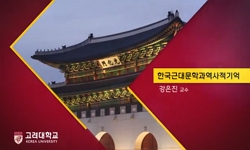After this treatise grasped the point that a character of the Baekhwa school was idealism, egoism, illuminism, and art for art’s sake, it investigated what appearances that these thoughts had reflected on the Korean modern literature to make Lee Kwa...
http://chineseinput.net/에서 pinyin(병음)방식으로 중국어를 변환할 수 있습니다.
변환된 중국어를 복사하여 사용하시면 됩니다.
- 中文 을 입력하시려면 zhongwen을 입력하시고 space를누르시면됩니다.
- 北京 을 입력하시려면 beijing을 입력하시고 space를 누르시면 됩니다.

일본 '백화파'에 대한 한일 비교문학적 연구 : 이광수와 김동인을 중심으로 Mainly Lee Kwang-Soo and Kim Dong-In = A study on the comparative literature of Korea & Japan on the "Baekhwa School" of Japan
한글로보기https://www.riss.kr/link?id=A40105551
- 저자
- 발행기관
- 학술지명
- 권호사항
-
발행연도
2003
-
작성언어
Korean
-
주제어
백화파 ; 이광수 ; 이동인 ; 이상주의 ; 자아중심주의 ; 계몽주의 ; 한국근대문학 ; 일본문학세계 ; 한일비교문학 ; 한국소설사 ; Baekhwa School ; Lee Kwang-Soo ; Kim Dong-In ; idealism ; egoism ; illuminism ; Korean modern literature ; Japanese literary world ; comparative literature of Korea & Japan ; history of Korean novel
-
KDC
809.000
-
등재정보
KCI등재후보
-
자료형태
학술저널
-
수록면
353-375(23쪽)
-
KCI 피인용횟수
4
- 제공처
- 소장기관
-
0
상세조회 -
0
다운로드
부가정보
다국어 초록 (Multilingual Abstract)
They, Lee Kwang-Soo and Kim Dong-In met with works and thoughts of the Baekhwa school writers to go to Japan about the time when they played an important role in the Japanese literary world. But they who had quite different characters and thoughts accepted the Baekhwa school through a different logical connection with each other.
When He, Lee Kwang-Soo had met with works, he formed an enlightenment consciousness of idealism, and Kim Dong-In egoism and art for art’s sake. The Baekhwa school is the representative writers in the Japanese idealism. They are an important writers from the viewpoint of on the comparative literature of Korea & Japan novel because the Baekhwa school had an effect on two writers who formed the basis of the Korean modern novel.
We find out that the Baekhwa school had an enormous effect on the Korean literature if we will consider a relative importance Lee Kwang-Soo and Kim Dong-In have come into possession of the history of Korean novel.
After this treatise grasped the point that a character of the Baekhwa school was idealism, egoism, illuminism, and art for art’s sake, it investigated what appearances that these thoughts had reflected on the Korean modern literature to make Lee Kwang-Soo and Kim Dong-In two pivot objects of study.
They, Lee Kwang-Soo and Kim Dong-In met with works and thoughts of the Baekhwa school writers to go to Japan about the time when they played an important role in the Japanese literary world. But they who had quite different characters and thoughts accepted the Baekhwa school through a different logical connection with each other.
When He, Lee Kwang-Soo had met with works, he formed an enlightenment consciousness of idealism, and Kim Dong-In egoism and art for art’s sake. The Baekhwa school is the representative writers in the Japanese idealism. They are an important writers from the viewpoint of on the comparative literature of Korea & Japan novel because the Baekhwa school had an effect on two writers who formed the basis of the Korean modern novel.
We find out that the Baekhwa school had an enormous effect on the Korean literature if we will consider a relative importance Lee Kwang-Soo and Kim Dong-In have come into possession of the history of Korean novel.
목차 (Table of Contents)
- 1. 백화파의 성립
- 2. 백화파의 사회 운동과 약점
- 3. 백화파 논쟁의 전개
- 4. 이광수의 계몽주의와 백화파 사상
- 5. 김동인의 예술지상주의와 백화파 사상
- 1. 백화파의 성립
- 2. 백화파의 사회 운동과 약점
- 3. 백화파 논쟁의 전개
- 4. 이광수의 계몽주의와 백화파 사상
- 5. 김동인의 예술지상주의와 백화파 사상
- 6. 결론
동일학술지(권/호) 다른 논문
-
- 한국현대문예비평학회
- 장도준
- 2003
- KCI등재후보
-
- 한국현대문예비평학회
- 정영자
- 2003
- KCI등재후보
-
- 한국현대문예비평학회
- 강현구
- 2003
- KCI등재후보
-
- 한국현대문예비평학회
- 박은태
- 2003
- KCI등재후보
분석정보
인용정보 인용지수 설명보기
학술지 이력
| 연월일 | 이력구분 | 이력상세 | 등재구분 |
|---|---|---|---|
| 2026 | 평가예정 | 재인증평가 신청대상 (재인증) | |
| 2020-01-01 | 평가 | 등재학술지 유지 (재인증) |  |
| 2017-01-01 | 평가 | 등재학술지 유지 (계속평가) |  |
| 2013-01-01 | 평가 | 등재학술지 유지 (등재유지) |  |
| 2010-01-01 | 평가 | 등재학술지 유지 (등재유지) |  |
| 2007-01-01 | 평가 | 등재학술지 선정 (등재후보2차) |  |
| 2006-07-07 | 학술지명변경 | 한글명 : 한국문예비평학회 -> 한국문예비평연구 |  |
| 2006-01-01 | 평가 | 등재후보 1차 PASS (등재후보1차) |  |
| 2005-01-01 | 평가 | 등재후보학술지 유지 (등재후보1차) |  |
| 2003-01-01 | 평가 | 등재후보학술지 선정 (신규평가) |  |
학술지 인용정보
| 기준연도 | WOS-KCI 통합IF(2년) | KCIF(2년) | KCIF(3년) |
|---|---|---|---|
| 2016 | 0.42 | 0.42 | 0.44 |
| KCIF(4년) | KCIF(5년) | 중심성지수(3년) | 즉시성지수 |
| 0.41 | 0.43 | 0.823 | 0.1 |




 KISS
KISS







